

Bicycle Racing News and Opinion,
Thursday, May 9, 2024
Back to news and opinion index page for links to archived stories | Commentary | Our YouTube page
2023 Tour de France | 2023 Giro d'Italia
Today you are you! That is truer than true! There is no one alive who is you-er than you! - Dr. Seuss
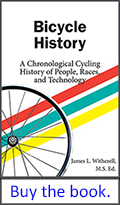
James Witherell's book Bicycle History: A Chronological History of People, Races and Technology is available in both print and Kindle eBook formats. To get your copy just click on the Amazon link on the right.
Current racing:
- May 4 - 26: Giro d'Italia
Upcoming racing:
- May 11: Tour du Finistère
Latest completed racing:
- May 5: Tro-Bro Léon
- May 4: GP du Morbihan
- May 1: Rund um den Finanzplatz Eschborn-Frankfurt
- April 21 - 28: Tour of Turkey
- April 23 - 28: Tour de Romandie
- April 26 - 28: Vuelta Asturias
- April 21: Liège-Bastogne-Liège
- April 15 - 19: Tour of the Alps
- April 17: La Flèche Wallone
We posted the report from the race organizer and third-place Andrea Pietrobon's Team Polti Kometa with the results.
Here's the report from fourth-place Enzo Paleni's Team Groupama-FDJ:
It took him just five stages in his first Grand Tour to get a glimpse of victory. On Wednesday, Enzo Paleni fought for the win on stage 5 of the Giro, after a superb breakaway towards Lucca. After an attack seventy kilometres from the finish, the young rider from the Groupama-FDJ managed, thanks to a great ride up front, to foil the peloton’s plans together with his three break mates. He was however beaten tactically in the last kilometre, and therefore settled for fourth place, which meant his first top-5 in a Grand Tour. Above all, he showed promising things in anticipation of the coming weeks.
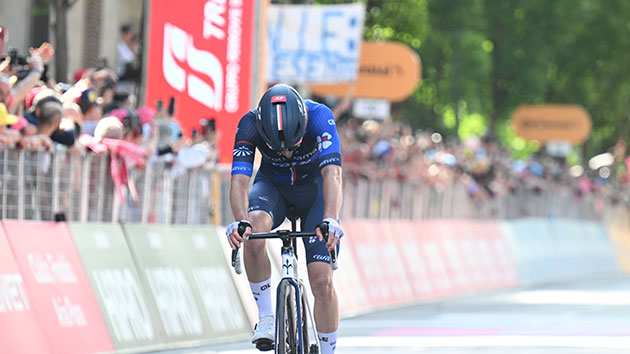
Enzo Paleni finishes stage five. Sirotti photo
From Genoa to Lucca, stage 5 of the Giro d’Italia was to conclude a three-day sequence made for the sprinters. At least, this was the most likely outcome on paper, despite a nice climb after fifty kilometres and a rolling one twenty kilometres from the line. “The sprint is never 100% guaranteed,” explained Frédéric Guesdon, “but it is true that at the start, there was a 95% chance that it would finish with a bunch sprint.”
In any case, Groupama-FDJ had decided to go on the attack, and Lewis Askey broke away with Mattia Bais (Polti-Kometa), Simon Geschke (Cofidis) and Manuele Tarozzi (VF Group -Bardiani CSF-Faizenè) from the first kilometres. The lead of the Briton and the rest of the breakaway, however, remained blocked at just 1’30, as the bunch set a high pace straight away. The four leaders therefore took it a bit easier, but the pack kept on going in the Passo del Bracco, after almost 50 kilometres. “It was a strong start to the race, because Alpecin-Deceuninck wanted to make it harder in order to drop the other sprinters,” explained Frédéric Guesdon. This attempt did not, however, really bear fruit since only Fabio Jakobsen was really left behind during the fifteen kilometers of climbing. At the summit, Lewis Askey and his companions only had a lead of fifteen seconds, and it all came back together in the downhill.
Back on the flat portion, a hundred kilometres from the finish, the peloton was back as one before a new race could start. After the intermediate sprint, a four-man attack then went with Benjamin Thomas (Cofidis), Michael Valgren (EF Education-EasyPost), Andrea Pietrobon (Polti-Kometa) and… Enzo Paleni! “When we got to the valley, no one was pulling anymore,” explained the young Frenchman. “With 2-3 guys, we organized to go after the sprint, around the feeding zone. We did go and said to ourselves: there are 70 kilometres left with the tailwind, we can do it!” “When we saw the composition of the group, we knew it was a strong one,” added Frédéric. “We had nothing to lose, we had to go for it, and force the others to ride while Laurence was sitting behind. It was almost the perfect plan. We had confidence in Enzo, because he had shown on day one that he was doing well. When he found himself in front, we told him: go for it.”
The peloton, however, did not want to play with the quartet, which never benefited from a bigger gap than a minute and a half. But entering the last hour of racing, when the chase became more intense, the sprinters’ teams struggled to gain seconds on the break. Thanks to a great collaboration, the breakaway could tackle the Montemagno climb (3km at 4%), 23 kilometres from the finish, a minute ahead.
Heading to Lucca, their advantage was only slightly reduced under the minute. “We managed it well until the climb, then from there, it was flat out until the finish,” said Enzo. “At the top of the climb, I was on the limit, so the final was very hard, but when you play for the win, you manage to transcend yourself.” “We encouraged him, we told him that it was doable,” added Frédéric. “We could clearly see that they were having a hard time behind, and that it wasn’t going to come back.” With ten kilometres to go, the four men were still 45 seconds ahead, and their lead was almost unchanged five kilometers further.
Two kilometres from the line, in the streets of Lucca, the peloton was still about half a minute behind. “We couldn’t look at each other, because if we did, it was all over,” added Enzo. “Even though I was on the limit, I continued to give everything.” The cooperation lasted until the flamme rouge, when the Italian Andrea Pietrobon tried to leave his rivals behind and fly to victory. “Everything happens in a split second,” Enzo said. “He hadn’t pulled for twenty kilometres, and he attacked in the final… I was in Valgren’s wheel, who didn’t respond. I was a bit stuck. There was a moment of hesitation, then I went for it, without pushing too hard so as not to be fooled. But when they opened the sprint, I had nothing left in my legs.”
Thanks to the young Frenchman’s turn, Michael Valgren and Benjamin Thomas managed to catch the leading rider. The former Groupama-FDJ rider won, while Enzo Paleni had to settle for fourth place, eight seconds ahead of the pack of sprinters. “Tactically, he wasn’t the best of the four, but that’s easy to say afterwards,” explained Frédéric. “It’s his first Grand Tour, and with the peloton behind, he couldn’t gamble too much. If he hadn’t reacted, I think all three would have looked at each other and would have been caught by the peloton. Anyway, coming fourth with a youngster like Enzo in a stage made for sprinters is very good.”
“I’m both satisfied and disappointed,” confessed the former rider of “La Conti”. “Fighting for victory in a Grand Tour doesn’t happen every day and it’s unfortunately a missed opportunity, but I’m still satisfied with what we managed to do. Foiling a sprint when it’s expected is quite nice. I gave everything, I can’t have regrets. I’ve also gained experience. I won’t be fooled twice. It will give me confidence and it’s motivating for the future. The Giro was a big goal for me. I was here to help Laurence but also to create opportunities for myself and fight for the win on some stages. I didn’t think it would happen so early, especially on a sprint stage, but it happened like that today. The victory is missing but it’s a good start.”
The Groupama-FDJ squad therefore scored its first noteworthy result since the start in Turin, and Laurence Pithie once again entered the top-20, in 16th position, despite having a knee discomfort. “It was a very good day for the team,” said the New Zealander. “We covered all the moves, which is what we wanted to do. It was a good thing to have someone in front, because I’m not the best sprinter at this race, so it’s better to have two cards to play. We were rewarded with Enzo’s fourth place, which is really cool for him. Hopefully we can continue to push and do well. My knee was a little better today, I’ve had a really good support from the team, and hopefully it can continue to improve each day.”
Here's the Giro report from eighth-place Tim Merlier's Team Soudal Quick-Step:
One of Italy’s most stunning cities, Lucca returned as a stage finish at the Corsa Rosa for the first time in almost four decades since the previous visit, when Francesco Moser won an individual time trial there. More shocking was that before Wednesday, the last time a road stage concluded there was in 1935 – the year the Vuelta a España was created.
On paper, it should have been a perfect opportunity for the sprinters to shine despite the presence of Passo del Bracco and Montemagno on the 178km course, but the script was ripped apart in the final 80 kilometers. This happened as a result of several teams pushing hard on the first climb of the day and catching the original breakaway early, which opened the door to fresh attacks.
The newly-formed quartet put a minute between them and the peloton, which should have been a manageable gap for the bunch, but the route – mostly downhill – the wind and the reluctance of some squads to commit to the chase all ended up playing into the escapees’ advantage, who made it for just a couple of seconds. Benjamin Thomas (Cofidis) took the win, while Tim Merlier sprinted to eighth place for his third top ten in as many consecutive stages here at the Giro d’Italia.
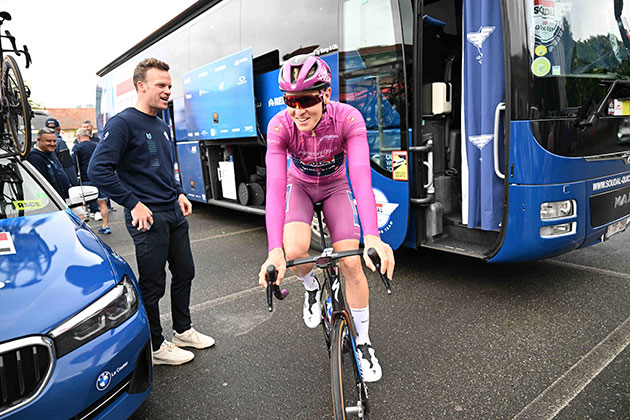
Tim Merlier heads to the start of stage four. Sirotti photo
Merlier, who was briefly dropped on Bracco before being brought back to the peloton by his Soudal Quick-Step teammates, shared his view on the stage: “Today there were some strange team tactics. Some squads killed themselves in an attempt to drop the sprinters and then the teams didn’t work well together. The breakaway remained clear, so chapeau to them. There’s not too much to say.”
Here's the report from Team Visma | Lease a Bike:
Olav Kooij was unable to sprint for the win in stage five. The peloton miscalculated and the early breakaway of four remained just ahead. Frenchman Benjamin Thomas won.
Early in the stage a group of several riders tried to break away from the peloton, but due to a lack of collaboration and a fairly high tempo in the peloton, they hardly succeeded. After a few dozen kilometers there was a climb and some of the sprinters were in difficulties. Kooij was well positioned at that point and survived the climb seemingly easily.
Ahead of an intermediate sprint, Christophe Laporte then crashed. The Frenchman was able to continue his way a few moments later, battered. In the closing stages of the stage, the frenzy in the peloton increased again after a group of four escaped. In the middle of the pack, a crash caused a stir, with Attila Valter one of the main riders involved. Valter, like Laporte, was able to complete the stage.
The peloton had to go all out in the final kilometers, but ended up being too late to catch the group of four. Kooij sprinted to ninth place, his third top ten ranking in a row.
Sports director Marc Reef gives his take on today's stage. "The stage initially went well for us. Olav was able to easily hold his on in the peloton on the first climb. In the hectic situation that ensued just before the intermediate sprint, Christophe crashed hard. Fortunately, he was able to continue his way and did not sustain any fractures. Attila also crashed, but the damage for him was limited to some scrapes. We tried to catch the breakaway by putting Edoardo Affini in front of the peloton, but to no avail. We can speak of a lesser day, but we have seen an upward trend with Olav. We can move forward with that," says Reef.
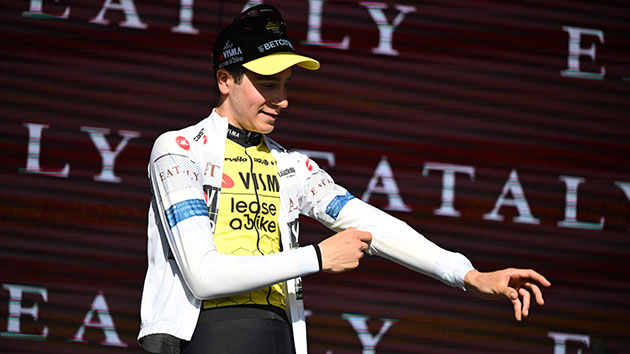
Cian Uijtdebroeks keeps the white jersey for another day. Sirotti photo
“It was a very tricky day,” said white jersey wearer Cian Uijtdebroeks afterwards. The youngster is still in fourth place in the general classification after stage five. “It's a shame that for Olav we didn't manage to grab the opportunity that was there. Even though there are a lot of sprint opportunities in this Giro d'Italia, it is and always will be a shame if you let one slip away. Tomorrow we will ride on gravel. I've never really done that before in competition, but I'm actually looking forward to it. I have also done a recon of the stage. We're going to make the most out of it again.”
And here’s the report from Team dsm-firmenich PostNL:
Another day possibly for the sprinters at the Giro d’Italia saw a hard and fast race, as they took on a 178 kilometer long route from Genoa to Lucca. With plenty of hills in the opening 90 kilometers, a hard pace could have been set and that’s exactly what happened on the ascent of Passo del Bracco. Catching the breakaway due to the pace, some groups had to let go of the bunch. Fabio Jakobsen was supported by Julius van den Berg and Gijs Leemreize, and after a big fight they returned to the peloton in the following valley.
After a lull in pace a new four-man group went away and built up an advantage of around one minute and 30 seconds where it held steady. Coming into the final climb they held onto a one minute advantage over the bunch, where some good positioning ensured Jakobsen got over the climb in the peloton. However, a tailwind combined with a committed effort from the four out front and a miscalculated effort by the peloton saw the quartet battle it out for the stage win in Lucca, surprising the sprint teams.
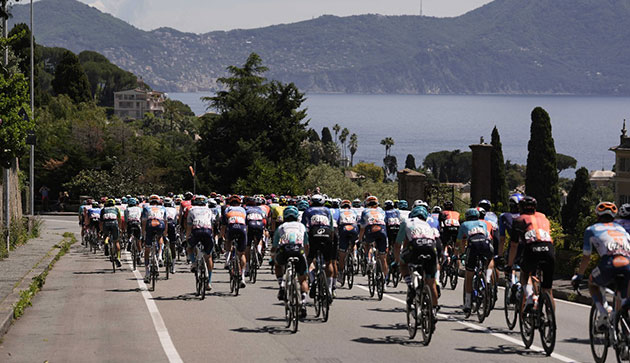
The peloton rolls down the Ligurian Seacoast
Speaking after the stage road captain Chris Hamilton expressed: “It was once again not a very straightforward sprint stage, which we thought it could have been at the start of the day. It was quite hard for the first half of the stage and Fabio did a good job to battle through with the guys, and to survive the last climb. In the end the break was strong and stayed away to fight for the win, and that was that really.”
Team dsm-firmenich PostNL coach Matt Winston added: “It was a hard first 90 kilometers where the guys showed some good fighting spirit to come back to the peloton. After that we were in control and Fabio rode a really good last climb and was there for the sprint. I think we were a bit too far back coming into the final though; we were just a little bit gassed from our earlier efforts. The break also rode well together and made it to the line anyway, so chapeau to them.”
Back to news and opinion index page for links to archived stories | Commentary







